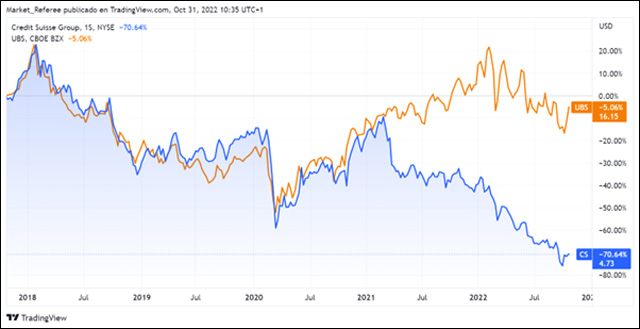Sinking slowly but steadily. Once the first largest bank in Switzerland in terms of total assets sees the ground slipping from underneath it. On a year-to-date basis, the company’s stock has depreciated by over 60%, whereas its closest competitor UBS has lost around 10% of its share value. Such discrepancy is due to some fundamental factors rather than cyclical developments.

For years, the bank tops disregarded risk management and mission planning standards. This led to a series of scandals, including a money laundering case with drug traffickers. Although the fine was a ridiculous CHF 2 mln, the reputational damage was enormous. Most recently, the company agreed to pay $495 million to settle a case involving mortgage investments in the U.S.
According to the New Jersey attorney general, Credit Suisse “misled investors and engaged in fraud or deception in connection with the offering and sale of mortgage-backed securities.” In its statement, the company stresses, “The settlement, for which Credit Suisse is fully provisioned, marks another important step in the bank’s efforts to pro-actively resolve litigation and legacy issues.”
The nails in the coffin were hammered in with the failed investments. Swiss bank clients lost $10 billion on transactions with fintech startup Greensill (which went bankrupt in 2021); Bill Hwang’s Archegos fund, which invested leveraged in high-risk stocks, cost $4.7 billion. It is hard to say whether it was a result of lack of a compliance or bad luck.
What if the company ends up defaulting? The collapse of Credit Suisse would cause a wave of panic. It’s improbable we will see a 2008 crisis 2.0, when the bankruptcy of Lehman Brothers caused a worldwide recession, however, a chain reaction could create a headache for many. Deutsche Bank Aktiengesellschaft, which is already breathing heavily, might also be in the crosshairs.
Finally yet importantly, despite a CHF 4.03 billion loss and a CHF 12.9 billion net asset outflow for Q3, Credit Suisse Group AG continues to fight for the right to exist. The zombie bank has presented investors with a new strategic development plan that includes:
– increasing capital through the sale of a large block of shares
– layoff of about 9,000 employees by the end of 2025
– sale of part of the investment business to a consortium of investors
Judging from the market reaction, Investors did not appreciate the news. Tables could turn if traders from Wallstreetbets decide to bet against the market. Alternatively, talks of a takeover by a larger bank could return optimism to investors.


 Hot Features
Hot Features













